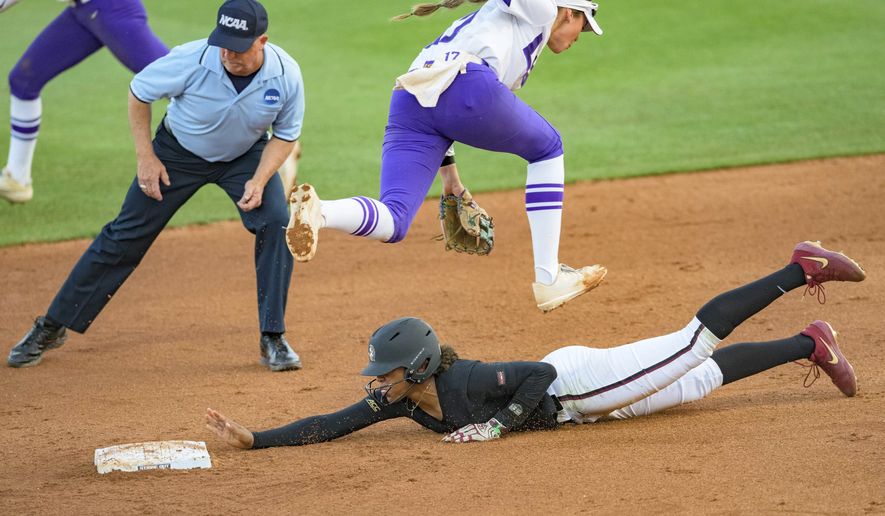The NCAA snubbed North Carolina over its 2016 “bathroom bill,” but boycotting red states over their transgender laws may be tougher when multiple states are involved.
The NCAA has come under fire for its decision to hold Division I softball regional tournaments in three states — Alabama, Arkansas and Tennessee — with recently signed bills barring transgender male-to-female athletes from competing in girls’ scholastic sports.
Athlete Ally and GLAAD accused the NCAA of “going back on its word” with its May 16 decision, citing its policy that “only locations where hosts can commit to providing an environment that is safe, healthy and free of discrimination should be selected.”
“Selecting states with discriminatory policies as sites for championship games goes directly against this policy by effectively banning transgender student athletes simply for being who they are,” said the joint statement. “We call on the NCAA to reverse this decision and support the right of all student-athletes — including transgender student-athletes — to be safe, healthy and free of discrimination while participating in NCAA events.”
Human Rights Campaign President Alphonso David said that the “NCAA should be ashamed of themselves for violating their own policy by choosing to hold championships in states that are not healthy, safe, or free from discrimination for their athletes.”
In a Wednesday letter, 50 current and former transgender and non-binary student-athletes called on the NCAA to stop holding championship games in states with “transgender athlete bans,” and to relocate tournaments from states that pass such legislation, as the NCAA did in 2016 when it moved seven games out of North Carolina.
Some news for @SInow: 50 current and former transgender and nonbinary college athletes have signed a letter to the NCAA over the organization’s recent decision to hold softball regional events in states that have signed anti-trans sports bills into law https://t.co/uItEID4C3S
— Julie Kliegman (@jmkliegman) May 26, 2021
“Now in 2021, the NCAA is hosting championship events in Alabama, Arkansas and Tennessee where anti-transgender legislation specifically targets trans and non-binary athletes and bans their participation in sport,” said the letter sponsored by Athlete Ally. “What changed? Why did our rights matter five years ago but not today?”
One thing that did change: States that pass such laws are no longer outliers.
While North Carolina was alone in passing a bill banning biological males from women’s public facilities, including restrooms and locker rooms, seven states in the last year have signed into law Fairness in Women’s Sports bills, with more expected before the end of the legislative session.
In South Dakota, Republican Gov. Kristi Noem vetoed such a bill in March but then signed an executive order requiring athletes to compete based on their sex at birth in K-12 athletics, not collegiate sports.
Four of the states belong to the Southeastern Conference [SEC], a dominant athletic conference and major moneymaker with $729 million in revenue in 2019-20, trailing only the Big Ten, according to USA Today.
Florida Gov. Rick DeSantis has said he will sign Senate Bill 1028, which would bring a fifth SEC state into the fold after Alabama, Arkansas, Mississippi and Tennessee.
Also passing such measures this year are Montana and West Virginia, following Idaho, which became the first state to sign the bill into law in 2020.
The Idaho law has yet to take effect after being hit with a preliminary injunction pending a lawsuit. The American Civil Liberties Union sued Wednesday to block the West Virginia bill, and other such lawsuits are expected to follow.
The state measures cover high school athletics in public schools, but not all the bills include collegiate sports.
The Louisiana state legislature gave final approval Thursday to a Fairness in Women’s Sports bill, but Democratic Gov. John Bel Edwards is expected to veto the measure.
In its April 12 statement, the NCAA said it would “continue to closely monitor these situations to determine whether NCAA championships can be conducted in ways that are welcoming and respectful of all participants.”
Texas Gov. Greg Abbott said last month he supported such legislation despite threats from companies to pull out of states that pass such measures, pointing out that Texas and Florida have outsize influence in U.S. sports.
“First, think, what if they don’t participate in Florida and Texas?” Mr. Abbott asked at an April 29 Fox News town hall hosted by Laura Ingraham. “Will they even be able to have sports events anymore in the United States? I don’t think so.”
The Texas bill, which passed the Senate, is likely dead after House Democrats delayed a floor vote Wednesday until after the deadline, the Texas Tribune reported.
Beth Stelzer, president of Save Women’s Sports and an advocate of the Fairness in Women’s Sports legislation, said “the threats from the NCAA were just that.”
“They have not pulled championships from states protecting female athletes,” she said in an email. “Even if they did, we need to do the right thing and stand up for females. People over profits. Facts over feelings.”
The NCAA allows male-to-female transgender student-athletes to compete on women’s teams after one year of testosterone suppression treatment, which she opposes, arguing that such athletes have other physical traits that give them an unfair advantage over biological females.
“If enough of us speak the truth, these organizations and corporations will have no choice but to protect women,” she said.
• Valerie Richardson can be reached at vrichardson@washingtontimes.com.




Please read our comment policy before commenting.